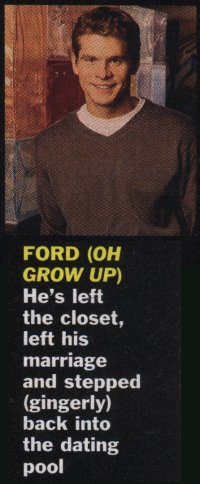Article
|
 |
Time Magazine -- October
25,
1999
TV'S COMING-OUT PARTY
Gay characters
have quietly become hot. Can their love lives?
The first Tuesday
of his second season on the air was a big day for Will Truman. Will,
the male half of NBC's Will & Grace, went on a date, after
spending last year setting an endurance record for getting over a
painful breakup. The date was with a hunky bookstore clerk we saw for
all of five teasing seconds, but it was a date nonetheless. His other
accomplishment: the Top-20 W&G beat its straight-couple
neighbor, ABC's Dharma & Greg, in the first round of a
pitched battle for ratings.
And there you have
the state of gayness on television in 1999: TV has come out, within
fuzzily defined but undeniable limits. Since the much touted coming
out of Ellen DeGeneres in 1997 -- and the much noted rapid demise of
her sitcom in the following season -- prime time has seen an influx
of popular, prominent and well-rounded gay characters without Ellen-esque
audience or advertiser cavils.
There are nearly
30 gay or lesbian characters in prime time (depending on how you
count and categorize them). Most are post-Ellen additions, and
they are no longer limited to bit roles and punch lines (though TNT
dropped a stereotypically gay "character" from World Championship Wrestling
after receiving complaints about gay bashing). ABC's Oh Grow Up
and Wasteland feature gay leads with actual, if tentative,
love lives (Ford, a lawyer who's just left his marriage, and Russell,
a closeted soap actor). |
Interestingly, in
a season of protest over the underrepresentation of racial
minorities, series creators have managed to add gay characters
without getting much pressure to do so. One factor is that while
coming out is still daunting to actors, there are a number of openly
gay TV writers and producers, including Wasteland's Kevin
Williamson, Oh Grow Up's Alan Ball and W&G's
co-creator and co-executive producer Max Mutchnick.
Mutchnick, Ball
and Williamson are mum on how much of their characters' love lives
audiences will see this season, and network execs' willingness to
show air kisses among actual gay characters is vague and jittery at
best. Weirdly, both Wasteland and Oh Grow Up have sent
their gay men on dates with men who turned out to be straight.
Williamson says Russell will have an active love life, but Ball and
Mutchnick say they're not that interested in entering the bedrooms of
their straight or gay characters. True, that's convenient. But
in a sense, to focus on the Kiss Question casts the issue in terms of
the schoolyard obsession of homophobes: What do they do
together? Do they kiss on the lips?
Ironically,
dialing down the sexual controversy has allowed W&G
writers to nurture the title pair's "sexless marriage," one
of TV's richest male-female relationships. "We were interested
in exploring what happens between a man and a woman when sex isn't a
factor," says Mutchnick. it has also enabled the writers to
develop the wonderful bipolar characters of straightlaced Will and
his unapologetically flaming pal Jack and to show that physical love
is not the sum of a gay person's identity.
Of course,
physical love ain't chopped liver, either. Avoiding all one-on-one
contact is a lacuna that will become all the more glaring as babes
like Will and Ford remain unattached. Even actor McCormack said this
summer that he felt Will was ready for an on-air kiss. As Ford tells
his estranged wife, "Sooner or later, I'm going to end up naked,
in bed, with another man." But when he does, he may be bound by
TV's answer to the military's fumbling version of tolerance. Go ahead
and ask, and please do tell. Just, for the love of God, don't show.
--James Poniewozik
Reviews | Oh Grow Up
